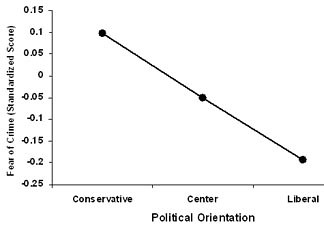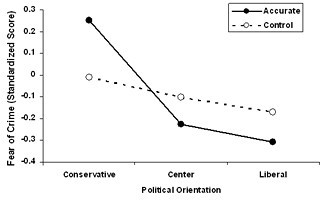Political Orientation Predicts Crime Estimates
There were 266 murders in New York City during 2006, according to the FBI.
We asked Texas Tech students to estimate how many murders there are on the NYC subways each year. The median number was 56. However, more than 8% of our participants estimated more than one murder per day on the subways alone.
What makes some people think that crime is so prevalent? And how does that happen in the brain?
The data are in for my most recent foray into the world of social reality. And I must admit that I am fascinated.
Last fall we ran a study to try to answer this question.
We have known for a long time that television viewing correlates with fear of crime. The more people view, the more fearful they are.
Shrum (2001) showed that if you tell people to try hard when making decisions about crime, then the relationship between TV and crime estimates drops out.
We thought that we could extend that by illustrating the role of a good memory.
But the data did not work. I had some vague idea why the study might have failed, but I was not sure. The thing that kept jumping out at me was that the original study was performed at Rutgers (a blue state), and we're here in West Texas (red-ville).
So we tried a more complete replication of the original study, and I tacked on some political and religious leaning questions at the end. They were the very last questions on the questionnaire so that they could not affect other answers.
Once again we have failed to replicate the original study. But now I just might know why. Political leaning appears to play a prominent role in estimating crime. Our data show that for conservatives, it is a mean world.

Recall that these new experiments were trying to explain why telling people to be "accurate" negated the effects to TV viewing. That is, when people in New Jersey were told to be accurate, they gave lower estimates of crime.
But accurate is relative. Just how likely is a crime if you walk through a New York City park every night for a month? There is some probability tied to this, but we could not likely every know it.
So, if you have a lot of fear, then what do you do when you are told to try really hard to be accurate?
You become more afraid.

For conservatives, the accurate world is a world with more crime. For liberals, the accurate world is a world with less crime.
Replicating Shrum's data depended on accurate becoming less crime-filled for those who watched a lot of TV. This simply did not happen for our conservative West Texas students.
The New Jersey sample surely had a minority of conservatives. These data are for 86 students who identified themselves as "strong conservative" or "conservative," 75 students who identified themselves as "center," and just 41 who identified themselves as "liberal" or "strong liberal."
These data add an interesting new piece to the puzzle.
I cannot, as a scientist, help but ponder the relationship to the current debate surrounding the war in Iraq. If the world is meaner to you, then Iraq represents a bigger threat. Admittedly this is speculative, but interesting to ponder.
We asked Texas Tech students to estimate how many murders there are on the NYC subways each year. The median number was 56. However, more than 8% of our participants estimated more than one murder per day on the subways alone.
What makes some people think that crime is so prevalent? And how does that happen in the brain?
The data are in for my most recent foray into the world of social reality. And I must admit that I am fascinated.
Last fall we ran a study to try to answer this question.
We have known for a long time that television viewing correlates with fear of crime. The more people view, the more fearful they are.
Shrum (2001) showed that if you tell people to try hard when making decisions about crime, then the relationship between TV and crime estimates drops out.
We thought that we could extend that by illustrating the role of a good memory.
But the data did not work. I had some vague idea why the study might have failed, but I was not sure. The thing that kept jumping out at me was that the original study was performed at Rutgers (a blue state), and we're here in West Texas (red-ville).
So we tried a more complete replication of the original study, and I tacked on some political and religious leaning questions at the end. They were the very last questions on the questionnaire so that they could not affect other answers.
Once again we have failed to replicate the original study. But now I just might know why. Political leaning appears to play a prominent role in estimating crime. Our data show that for conservatives, it is a mean world.

Recall that these new experiments were trying to explain why telling people to be "accurate" negated the effects to TV viewing. That is, when people in New Jersey were told to be accurate, they gave lower estimates of crime.
But accurate is relative. Just how likely is a crime if you walk through a New York City park every night for a month? There is some probability tied to this, but we could not likely every know it.
So, if you have a lot of fear, then what do you do when you are told to try really hard to be accurate?
You become more afraid.

For conservatives, the accurate world is a world with more crime. For liberals, the accurate world is a world with less crime.
Replicating Shrum's data depended on accurate becoming less crime-filled for those who watched a lot of TV. This simply did not happen for our conservative West Texas students.
The New Jersey sample surely had a minority of conservatives. These data are for 86 students who identified themselves as "strong conservative" or "conservative," 75 students who identified themselves as "center," and just 41 who identified themselves as "liberal" or "strong liberal."
These data add an interesting new piece to the puzzle.
I cannot, as a scientist, help but ponder the relationship to the current debate surrounding the war in Iraq. If the world is meaner to you, then Iraq represents a bigger threat. Admittedly this is speculative, but interesting to ponder.
Labels: experiment, politics, social reality, television, violence




 FOLLOW SAM ON TWITTER
FOLLOW SAM ON TWITTER
 SUBSCRIBE TO THIS FEED
SUBSCRIBE TO THIS FEED
